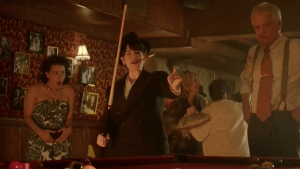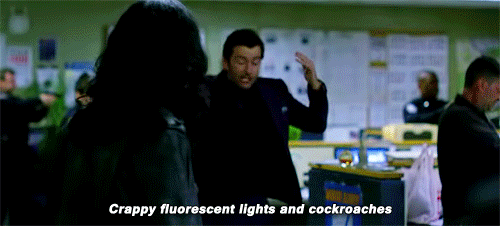From the beginning of my journey into Jessica Jones’s world back in Season 1 to where I stand now, halfway through Season 2, an aspect that always interested me more than any other, while equally intriguing me, was the law system in the show, more specifically its corruption. Anomalies within the justice system was present in many episodes, such as in the very first, when a married male strip club owner caught having an affair with another woman by Jessica, and issued a subpoena to attend court, still leaves with a verdict of not guilty, to the episode I am on in Season 2 where Jessica and her step-sister Trish are released from prison after falsely being accused of a murder committed by, pretty much, a monster. This constant repetition of false trials and incorrect decisions, in addition to representing the inevitable inconsistencies in the justice system in the real world, especially in a populous city such as New York (the show’s setting), also demonstrate the fact that justice is simply a relative term that can easily be manipulated by people looking to take advantage of its inconsistencies.
Jessica Jones is presented as an ideal example of someone who not only endures a lack of justice provided in the first place given her minority status in the overall population around her (a female with super-powers), but also someone who constantly has to endure the consistently manipulated justice. From the reaction of passersby whenever Jessica reveals a snippet of her superhuman strength to the reaction of the jury whenever her super-powers came into picture in the court, which she has visited plenty of times due to falsely being accused of crimes, it is obvious that the society dislikes anyone with such abnormalities, even if they have them without their consent, as is the case for Jessica as she was experimented upon as a child. In addition, she has also witnessed several instances of people using this flimsy justice system to their advantage, a prime example being Kilgrave, who, as Jessica herself has recalled several times, has raped her, forced her to kill someone, and provided her with a strong case of PTSD because of those reasons and his mind-controlling abilities, all without suffering any consequences. Jessica, however, after successfully managing to kill him in the end of Season 1, is sent straight to prison for murdering someone who has tormented her and several other lives.
Finally, as it can be seen by the instances above, Jessica Jones has made many more visits to courts than any male character in the show, including her neighbor Malcolm, who has been present with her following many of the murders (although to help her most of the time) and still remained unquestioned by the police. This trend can therefore relate the justice system in the show to gender axes as well, making the law system in the show that much more corrupted but still interesting to discover more corruption of.

“One, keep denying it…”























